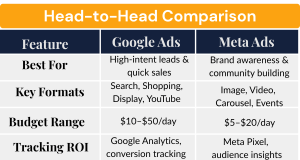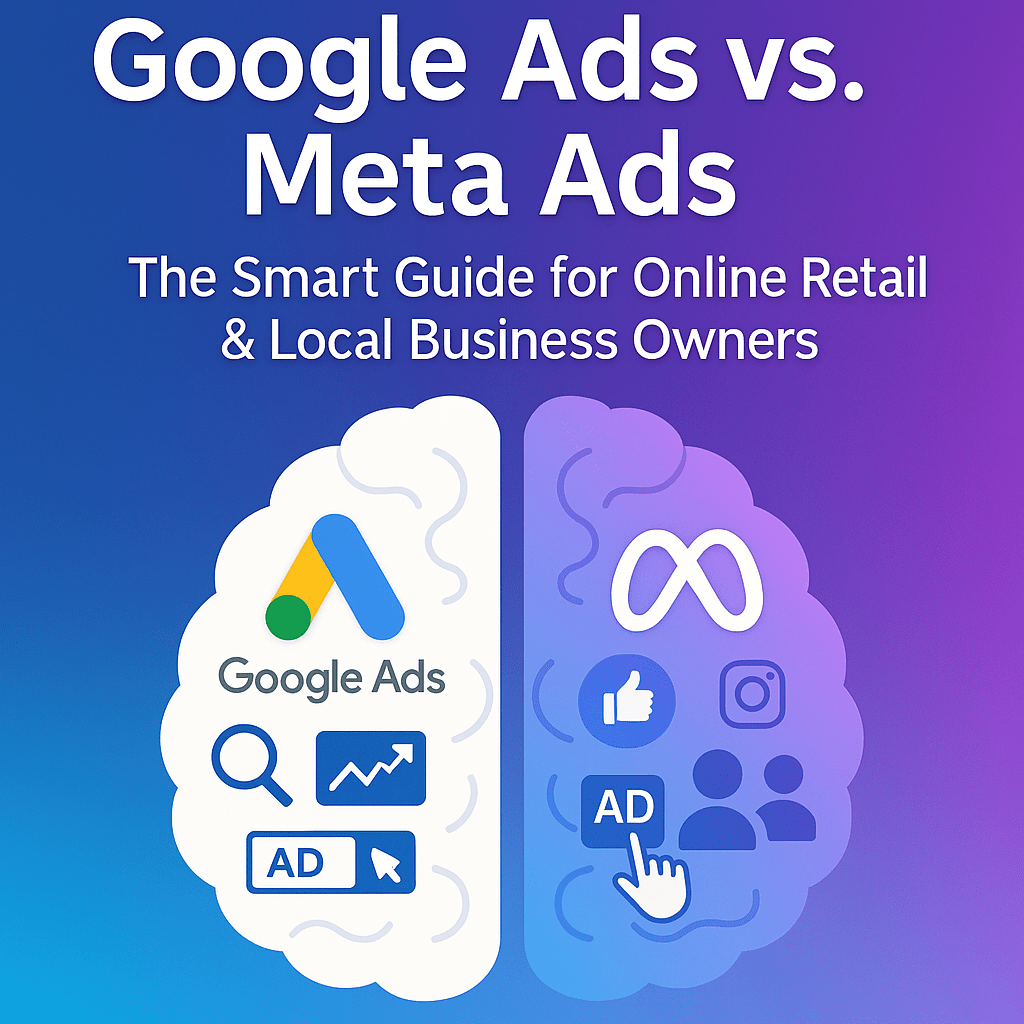Introduction
If you’re running an online retail store or managing a local service business, you’ve probably asked: Should I be using Google Ads or Meta Ads? The truth is, both platforms can drive results, but how and when you use them makes all the difference.
Google Ads captures people actively searching for your products or services, while Meta Ads helps you build awareness as potential customers scroll through Instagram or Facebook. To grow your business without wasting budget, you need to understand which platform aligns best with your goals.
Let’s dive into a clear comparison so you can confidently invest in what works.
TL;DR:
This guide breaks down the strengths of Google Ads vs. Meta Ads for online retail and local businesses, so you can drive more sales, bookings, and brand visibility without guesswork.
Why This Matters for Local Business Owners
Whether you’re running a yoga studio, wellness shop, or online boutique, your time and budget are limited. You want reliable strategies that generate revenue, not just clicks. This guide is for the hands-on entrepreneur looking for practical, results-driven solutions to reach more customers online and locally.
Know Your Audience Before Choosing a Platform
Your ideal customer is:
Searching Google for solutions or local businesses
Browsing Instagram or Facebook for ideas, recommendations, and inspiration
Responding to authenticity, visuals, and personalized messaging
Understanding how your audience behaves online will help you choose the best platform and create ads that convert.
Google Ads: Capture High-Intent Shoppers
What It Is:
Google Ads is intent-based advertising. Your ads show up when people are actively searching for what you offer, like “yoga class near me” or “buy essential oils online.”
Key Formats:
Search Ads: Text-based ads triggered by keywords
Shopping Ads: Product images with price and reviews
Display Ads: Banners shown across websites
YouTube Ads: Video content for brand awareness
Why It Works:
Reaches people who are ready to buy or book
Targets by location with local campaigns
Delivers fast, trackable results
Pros:
High purchase intent
Clear ROI with built-in analytics
Flexible budgeting
Cons:
Can be expensive for competitive keywords
Requires regular optimization
Quick Tip:
Start with search ads targeting your top product or service using phrases like “best [product/service] near [neighborhood].”
Meta Ads: Build Awareness & Engage Your Community
What It Is:
Meta Ads cover Facebook, Instagram, Messenger, and the Audience Network. They’re ideal for connecting with your community, telling your brand story, and promoting events or offers.
Key Formats:
Image & Video Ads: Show your products, space, or team
Carousel & Collection Ads: Highlight multiple offers in one ad
Dynamic Product Ads: Automatically show relevant items to users
Event/Offer Ads: Great for promotions or local happenings
Why It Works:
Excellent for brand storytelling
Highly visual—perfect for lifestyle brands
Affordable and versatile for small businesses
Pros:
Strong engagement and trust-building
Powerful local targeting by interest, behavior, or life events
Great for retargeting
Cons:
Users aren’t always in “buy now” mode
Requires consistent, creative content
Quick Tip:
Use behind-the-scenes videos and local testimonials to humanize your brand and boost engagement.

When to Use Each Platform
Use Google Ads When You Want To:
Drive immediate sales or bookings
Promote new product launches or limited-time offers
Attract people actively searching for solutions
Use Meta Ads When You Want To:
Grow your local brand and audience
Share events, testimonials, or behind-the-scenes stories
Retarget visitors and past customers
Can You Use Both? Absolutely.
The most successful businesses integrate both platforms:
Google Ads captures high-intent leads who are ready to convert.
Meta Ads keeps your brand top-of-mind and nurtures long-term customer relationships.
Integrated Strategy Example:
Run a Google Ads campaign for bookings. Then use Meta Ads to retarget visitors with client success stories, upcoming events, or limited-time offers.
Practical, Budget-Friendly Strategies
Feature Real Testimonials: Build trust with authentic voices in your ads.
Promote Community Events: Highlight local partnerships or seasonal classes.
Keep Your Google Business Profile Updated: Enhances both organic and paid visibility.
Use Geo-Targeting: Focus ads within a few miles of your location for hyper-relevance.
Track Everything: UTM codes, Google Analytics, and Meta Pixel will tell you what’s working.
Bonus Tips for Maximum ROI
Respond Quickly: Fast replies turn clicks into clients.
Be Human: Use video to show the people behind the brand.
Create Scarcity: Promote early bird specials or limited-time deals.
Encourage Shares & Reviews: Social proof boosts conversions.
Stay Consistent: A steady presence drives recognition and trust.
Final Thoughts: Invest Wisely, Grow Consistently
There’s no one-size-fits-all answer. The real magic happens when you align your goals with the right ad platform, or better yet, combine them. Google Ads drives action. Meta Ads builds a connection. Together, they fuel sustainable growth.
Want More Done-for-You Ad Strategies?
Download our free guide: “How to Laser Target New Customers Who Need Your Help, RIGHT NOW.”
It’s packed with actionable tips to grow your local or online business—without wasting time or money.

